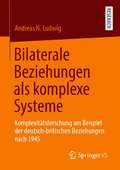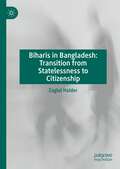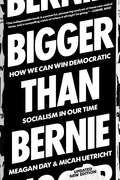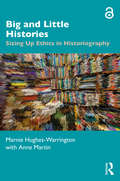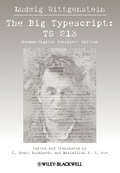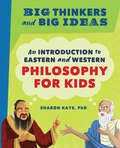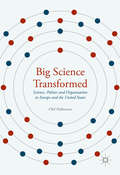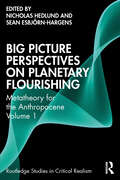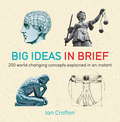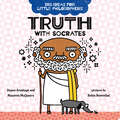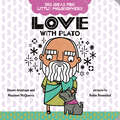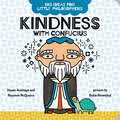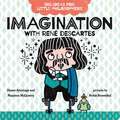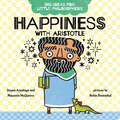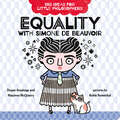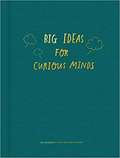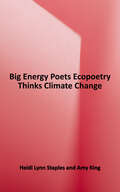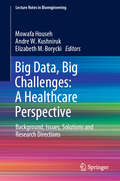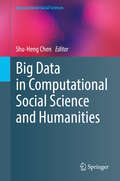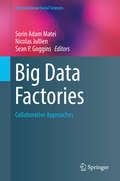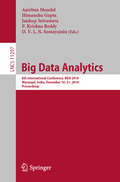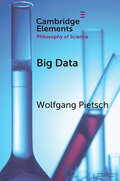- Table View
- List View
Bilaterale Beziehungen als komplexe Systeme: Komplexitätsforschung am Beispiel der deutsch-britischen Beziehungen nach 1945
by Andreas N. LudwigDie Studie liefert einen innovativen Beitrag zur Komplexitätsforschung in den Internationalen Beziehungen und deren Beschäftigung mit bilateralen Beziehungen. Andreas N. Ludwig entwickelt auf der wissenschaftsphilosophischen Grundlage komplexen Denkens (u.a. nach Edgar Morin) sowie in Auseinandersetzung mit der Entwicklung des deutsch-britischen Gefüges eine neue, systemtheoretische wie historische Perspektive auf das zentrale Phänomen des Austauschs zweier Akteure im Rahmen des globalen Miteinanders. Er fasst in diesem Zuge Dyaden als komplexe Beziehungssysteme auf, für deren Untersuchung er die Methode eines komplexen Narrativs vorschlägt. Seine verstehende Rekonstruktion der zeitgebundenen Themenfelder sowie von Dynamik und Wandel des Verhältnisses von Deutschen und Briten nach 1945 geht dabei ferner eine auffällige Lücke der politikwissenschaftlichen Forschung der letzten Jahrzehnte an.
Bikario Savoiarraren fede-aitortza
by Jean-Jacques Rousseau Esteban Antxustegi IgartuaUnibertsoaren ordenaz pentsatzen dut, ez sistema hutsekin azaltzeko bakarrik, hura etengabe miresteko eta unibertsoan sentitzen den haren egile jakintsua gurtzeko baizik. Harekin mintzatzen naiz, haren esentzia jainkotiarrez betetzen ditut nire ahalmenak, haren onurek hunkitzen naute, haren dohainak bedeinkatzen ditut, baina ez dut otoitzik egiten. Zer eskatuko diot? Gauzen bilakaera nigatik alda dezala? Nire aldeko mirariak egin ditzala? Nahi al nuke nik, gauza guztien gainetik haren jakinduriak ezarritako eta haren probidentziak iraunarazitako ordena maitatu behar duen honek, halako ordena nire erruz nahastea? Ez, horrelako eskaera ausartegia onartu beharrean, zigortu egin beharko litzateke. Ongia egiteko ahalmena ere ez diot eskatzen. Zergatik eskatuko diot jadanik eman didana? Ez al dit eman kontzientzia ongia maitatzeko, arrazoia ezagutzeko eta askatasuna hautatzeko? Gaizki egiten badut, ez dut aitzakiarik; nahi dudalako egiten dut: nire borondatea alda dezala eskatzea hark niri eskatzen didana eskatzea da, berak lan egitea eta nik soldata kobratzea nahi izatea da; nire mailarekin pozik ez egotea, gizakia ez izatea nahi izatea da, eta, existitzen denetik kanpoko zerbait nahi izatea desordena eta gaizkia nahi izatea da.
Bihozberatasunaz
by Elena Zalakain Lazpiur Igor Yarza Iraola Luzio A. SenekaBaina, zergatik ez du barkatuko? Zehatz dezagun orain, bada, zer den barkamena, eta ikusiko dugu jakitunak ez duela eman behar. Barkamena zigor mereziaren absoluzioa da. Jakitunak zergatik ez duen eman behar luze azalduko dizute gai hori espresuki jorratu dutenek. Nik, ez dagokidan epaian banengo bezala, labur aritze aldera, zera esango dizut: barkamena ematen zaio zigorra jaso beharko lukeenari, baina jakitunak ez du aintzakotzat hartzen egin behar ez duen ezer. Beraz, zigorra jartzeko betebeharra duenez, ez du barkatuko. Baina barkamenaren bitartez lortu nahi duzuna beste bide duinago batek emango dizu. Izan ere, jakituna bihozbera izango da, ardura hartu eta zuzenduko du; barkamena emango balu bezala egingo du, baina ez du barkatuko, barkatzen duenak egin beharreko zerbait ez duela egin onartzen baitu.
Biharis in Bangladesh: Transition from Statelessness to Citizenship
by Zaglul HaiderThis book deals with the citizenship status of the Biharis in Bangladesh and their ability to access rights associated with citizenship. The main argument of the book is that although legally the Biharis are citizens of Bangladesh, they still do not have access to many important rights of citizenship that can make their citizenship meaningful. Their inability to access many important citizenship rights made them de facto stateless, although they are de-jure citizens. Taking a law and society approach this book examines both legal and non-legal factors behind the deplorable conditions of the Biharis in Bangladesh. Based on fieldwork, this book analyses that the Biharis’ inability to access citizenship rights is inconsistent with citizenship theory, citizenship laws, and the Constitution of Bangladesh. To make the Biharis citizenship effective or meaningful the author suggests some recommendations for policy changes that would enable Biharis to access rights associated with citizenship.
Bigger Than Bernie: How We Go from the Sanders Campaign to Democratic Socialism
by Micah Uetricht Meagan DayWin or lose, Bernie has reshaped the landscape of American politics. Where does the political revolution go next?The political ambitions of the movement behind Bernie Sanders have never been limited to winning the White House. Since Bernie first entered the presidential primaries in 2016, his supporters have worked to organize a revolution intended to encourage the active participation of millions of ordinary people in political life. That revolution is already underway, as evidenced by the massive growth of the Democratic Socialists of America, the teachers Bernie motivated to lead strikes across red and blue states, and the rising new generation of radicals in Congress—led by Alexandria Ocasio-Cortez and Ilhan Omar—inspired by his example.In Bigger than Bernie, activist writers Meagan Day and Micah Uetricht give us an intimate map of this emerging movement to remake American politics top to bottom, profiling the grassroots organizers who are building something bigger, and more ambitious, than the career of any one candidate. As participants themselves, Day and Uetricht provide a serious analysis of the prospects for long-term change, offering a strategy for making &“political revolution&” more than just a campaign slogan. They provide a road map for how to entrench democratic socialism in the halls of power and in our own lives.Bigger than Bernie offers unmatched insights into the people behind the most unique campaign in modern American history and a clear-eyed sense of how the movement can sustain itself for the long haul.
Big and Little Histories: Sizing Up Ethics in Historiography
by Anne Martin Marnie Hughes-WarringtonThis book introduces students to ethics in historiography through an exploration of how historians in different times and places have explained how history ought to be written and how those views relate to different understandings of ethics. No two histories are the same. The book argues that this is a good thing because the differences between histories are largely a matter of ethics. Looking to histories made across the world and from ancient times until today, readers are introduced to a wide variety of approaches to the ethics of history, including well-known ethical approaches, such as the virtue ethics of universal historians, and utilitarian approaches to collective biography writing while also discovering new and emerging ideas in the ethics of history. Through these approaches, readers are encouraged to challenge their ideas about whether humans are separate from other living and non-living things and whether machines and animals can write histories. The book looks to the fundamental questions posed about the nature of history making by Indigenous history makers and asks whether the ethics at play in the global variety of histories might be better appreciated in professional codes of conduct and approaches to research ethics management. Opening up the topic of ethics to show how historians might have viewed ethics differently in the past, the book requires no background in ethics or history theory and is open to all of those with an interest in how we think about good histories.
Big Typescript
by Ludwig Wittgenstein C. Grant Luckhardt Maximilian E. AueLong awaited by the scholarly community, Wittgenstein's so-called "Big Typescript" (von Wright Catalog # TS 213) is presented here in an en face English-German scholar's edition. Presents scholar's edition of important material from 1933, Wittgenstein's first efforts to set out his new thoughts after the publication of the "Tractatus Logico Philosophicus" Includes indications to help the reader identify Wittgenstein's numerous corrections, additions, deletions, alternative words and phrasings, suggestions for moves within the text, and marginal comments
Big Thinkers and Big Ideas: An Introduction to Eastern and Western Philosophy for Kids
by Sharon Kaye Ph.D.An introductory guide to Eastern and Western philosophy for kids ages 8 to 12 Philosophy is both fun and good for kids' brains, as it encourages them to think deeply and develop their own solutions to complex problems. With this colorful book about philosophy for kids, they'll learn all about introductory concepts and important thinkers in a way that's fun and approachable, but still in-depth and substantial. Your child will explore questions like: "What is real?", "How do I know something is true?", "How can I be a good person?", and "If this is true, what else is true?" A detailed glossary offers easy-to-understand definitions for the more advanced words and ideas in the book. Dive into philosophy for children with: An intro to philosophy—Get essential information about the origins of philosophy, the different branches, and the benefits of studying it. The four main branches—Discover the main branches of philosophy: metaphysics (reality), epistemology (knowledge), logic (critical thinking), and ethics (values). Philosopher profiles—Learn about different kinds of philosophy from all over the world and details about philosophers like Socrates, Pythagoras, Nancy Fraser, and Neil deGrasse Tyson. Inspire your child to think deeply with this perfect introduction to philosophy for kids.
Big Science Transformed: Science, Politics and Organization in Europe and the United States
by Olof HallonstenThis book analyses the emergence of a transformed Big Science in Europe and the United States, using both historical and sociological perspectives. It shows how technology-intensive natural sciences grew to a prominent position in Western societies during the post-World War II era, and how their development cohered with both technological and social developments. At the helm of post-war science are large-scale projects, primarily in physics, which receive substantial funds from the public purse. Big Science Transformed shows how these projects, popularly called 'Big Science', have become symbols of progress. It analyses changes to the political and sociological frameworks surrounding publicly-funding science, and their impact on a number of new accelerator and reactor-based facilities that have come to prominence in materials science and the life sciences. Interdisciplinary in scope, this book will be of great interest to historians, sociologists and philosophers of science.
Big Picture Perspectives on Planetary Flourishing: Metatheory for the Anthropocene Volume 1 (Routledge Studies in Critical Realism)
by Sean Esbjörn-Hargens Nicholas HedlundThis book, split across two volumes, is a follow-up and companion to Metatheory for the Twenty-First Century (Routledge, 2016). All three of these volumes are the dialogical outcome of a multi-year symposia series wherein critical realists and integral theorists deeply engaged each other and their distinct but complementary approaches to integrative metatheory. Whereas Metatheory for the Twenty-First Century is primarily theoretical in its focus, Big Picture Perspectives for Planetary Flourishing: Metatheory for the Anthropocene aims to more concretely and practically address the complex planetary crises of a new era that many scholars now refer to as ‘the Anthropocene.’ In this first of two new volumes, participants of the symposia series articulate a variety of ‘big picture perspectives’ and transformative interventions in the domains of society and economics, social psychology, and education. Together, these chapters demonstrate how integrative metatheory and its application can make powerful contributions to planetary flourishing in the Anthropocene. With one of the defining characteristics of the Anthropocene being the sheer complexity and multi-valent nature of our interconnected global challenges, these volumes crucially present new forms of scholarship that can adequately weave together insights from multiple disciplines into new forms of metapraxis. As such, this book will be of interest to students, scholars, and practitioners in the areas of philosophy, social theory, critical realism, integral studies, metamodernism, and current affairs generally.
Big Ideas in Brief: 200 World-Changing Concepts Explained In An Instant (IN MINUTES)
by Ian CroftonBig Ideas in Brief provides an accessible and easily understood tour of 200 key concepts that really matter. The ideas covered come from a wide range of subjects - Philosophy, Religion, Science, Politics, Economics, Sociology, Anthropology, Psychology and the Arts. A series of short and lively articles accompanied by 100 illustrations introduce a host of diverse topics, all explained simply and clearly.
Big Ideas in Brief: 200 World-Changing Concepts Explained In An Instant
by Ian CroftonBig Ideas in Brief provides an accessible and easily understood tour of 200 key concepts that really matter. The ideas covered come from a wide range of subjects - Philosophy, Religion, Science, Politics, Economics, Sociology, Anthropology, Psychology and the Arts. A series of short and lively articles accompanied by 100 illustrations introduce a host of diverse topics, all explained simply and clearly.
Big Ideas for Little Philosophers: Truth with Socrates (Big Ideas for Little Philosophers #4)
by Duane Armitage Maureen McQuerryExplore the importance of truth with the youngest readers in a wonderfully accessible way.Even little children have big questions about life. Socrates believed being truthful and asking questions about the world can make us wise, and Truth with Socrates brings his philosophy to the youngest thinkers. From the importance of being honest even if it's hard or makes you scared to always asking questions to understand more about everything around you, this book will lead to inspiring conversations about human dynamics between people of all ages.Look for all six Big Ideas for Little Philosophers board books: Equality with Simone de Beauvoir, Truth with Socrates, Happiness with Aristotle, Imagination with René Descartes, Kindness with Confucius, Love with Plato, and Truth with Socrates.
Big Ideas for Little Philosophers: Love with Plato (Big Ideas for Little Philosophers #6)
by Duane Armitage Maureen McQuerryExplore the importance of love with the youngest readers in a wonderfully accessible way.Even little children have big questions about life. Plato believed showing and receiving love makes us wise, and Love with Plato brings his philosophy to the youngest thinkers. Asking young readers what being loved feels like to them and how they can show others love prompts questions about how we treat one another and ourselves. This book will lead to inspiring conversations about loving people for what is on the inside, and helping others do the same.Look for all six Big Ideas for Little Philosophers board books: Equality with Simone de Beauvoir, Happiness with Aristotle,Imagination with René Descartes, Kindness with Confucius, Love with Plato, and Truth with Socrates.
Big Ideas for Little Philosophers: Kindness with Confucius (Big Ideas for Little Philosophers #5)
by Duane Armitage Maureen McQuerryExplore the importance of kindness with the youngest readers in a wonderfully accessible way.Even little children have big questions about life. Confucius believed always treating people with kindness can make us wise, and Kindness with Confucius brings his philosophy to the youngest thinkers. He believed we should use our own feelings as a guide to how to treat others. We feel good when people are kind to us and should want to make others feel that way. Emphasizing the importance of being in touch with your own emotions in order to be kind to others, this book will lead to inspiring conversations about human dynamics between people of all ages.Look for all six Big Ideas for Little Philosophers board books: Equality with Simone de Beauvoir, Happiness with Aristotle, Imagination with René Descartes, Kindness with Confucius, Love with Plato, and Truth with Socrates.
Big Ideas for Little Philosophers: Imagination with René Descartes (Big Ideas for Little Philosophers #3)
by Duane Armitage Maureen McQuerryExplore the importance of imagination with the youngest readers in a wonderfully accessible way. Even little children have big questions about life. Imaginations are unique to every human on earth and René Descartes believed that is what makes every person their own true self. By thinking about what we imagine and how all people imagine differently, kids can work on understanding others' perspectives and points of view and become more empathetic. Imagination with René Descartes will help them see how using your imagination makes you "you" and understanding the same about friends and family is an important part of getting along in a community.Look for all six Big Ideas for Little Philosophers board books: Equality with Simone de Beauvoir, Truth with Socrates, Happiness with Aristotle, Imagination with René Descartes, Kindness with Confucius, Love with Plato, and Truth with Socrates.
Big Ideas for Little Philosophers: Happiness with Aristotle (Big Ideas for Little Philosophers #2)
by Duane Armitage Maureen McQuerryExplore the importance of happiness with the youngest readers in a wonderfully accessible way.Even little children have big questions about life. Finding happiness is a lifelong goal and Aristotle thought deeply about it. Why are we here? What is the best way to live a happy life? Having friends who are fun and adventurous is important, but it's also important to have true friends who will help us be good people and tell us when we're straying from that. He also believed we have to love ourselves in order to love others and be happy. This book will prompt readers to concentrate on what makes them happy and how they can be a good friend to others and themselves.Look for all six Big Ideas for Little Philosophers board books: Equality with Simone de Beauvoir, Truth with Socrates, Happiness with Aristotle, Imagination with René Descartes, Kindness with Confucius, Love with Plato, and Truth with Socrates.
Big Ideas for Little Philosophers: Equality with Simone de Beauvoir (Big Ideas for Little Philosophers #1)
by Duane Armitage Maureen McQuerryExplore the importance of equality with the youngest readers in a wonderfully accessible way.Even little children have big questions about life. Simone de Beauvoir focused much of her work on the concept of equality, insisting that girls and boys and women and men should have the same opportunities to be happy. Everyone should have the right to be themselves and be treated with respect no matter what. Kids will come away from this book encouraged to think about how the same things can make girls and boys happy or sad or excited, and everyone should listen to who they are on the inside and respect that in others.Look for all six Big Ideas for Little Philosophers board books: Equality with Simone de Beauvoir, Truth with Socrates, Happiness with Aristotle, Imagination with René Descartes, Kindness with Confucius, Love with Plato, and Truth with Socrates.
Big Ideas For Curious Minds: An Introduction To Philosophy
by Alain De Botton The School of Life Anna DohertyWithout prompting, they ask some of the largest questions about time, mortality, happiness and the meaning of it all. Yet too often this inborn curiosity is not developed and, with age, the questions fall away. This is a book designed to harness children's spontaneous philosophical instinct and to develop it through introductions to some of the most vibrant and essential philosophical ideas of history. The book takes us to meet leading figures of philosophy from around the world and from all eras - and shows us how their ideas continue to matter.
Big Energy Poets: Ecopoetry Thinks Climate Change
by Amy King Heidi Lynn StaplesThis is more than another book on climate change, these disparate authors are collectively voices in the same struggle: How to ensure the planet's survival, where planet and body (human or otherwise) are not separate but synonymous, are inextricably tied. There is a necessary insistence in this anthology on the body politic being the earth's politic. Together, this is a creative treatise toward the integrity of continuance, and against fear of the other, the 'other' being as much 'nature' as person. The introduction asks, 'Why poetry?' to confront the urgency of climate change and all of its implications and causalities. The answer is found in the challenge taken up by these poets as they allow us access to both their poetry and their process. Here authors utilize their critical and creative practices to forward a conversation we can simply not afford to ignore. Race, gender, genocide, these poets are asking questions and further, daring to question themselves. It may surprise some how many of the poets feel the poem as inhabiting the body and it becomes easier through that understanding to see how the poet, the body of the poet, connects to the land, to the environments in which they find themselves. Indeed, several of these poets even as they put words to the page in all manner of formats and styles, literally put their bodies on the line that marks the difference between apathy and action by marching, picketing and refusing to stop creating or privileging the power of the imagination to alter our course. Read this, powerful, instructional, and inspiring, it does what we want poetry to do, move us. The writing of poetry can make one adept at discerning systems, correlations, and interconnections. Ecopoetry is the nexus of science, activism and poetics. From Anna Lena Phillips Bell's intimate litanies of trees that bring to mind the names of children in a class ledger, to Lucas de Lima's take on transmogrification, to Meta Sama's evocative conflations of 'hair,' 'river' and 'sand,' here we find the polemics of universal intersectionality, a necessary embracement, where we all have something at stake and at risk. As Brenda Hillman writes in her essay, A Brutal Encounter Recollected in Tranquility, writing may be your most necessary action but you can't be the only one."--Vievee Francis
Big Data, Big Challenges: Background, Issues, Solutions and Research Directions (Lecture Notes in Bioengineering)
by Mowafa Househ Andre W. Kushniruk Elizabeth M. BoryckiThis is the first book to offer a comprehensive yet concise overview of the challenges and opportunities presented by the use of big data in healthcare. The respective chapters address a range of aspects: from health management to patient safety; from the human factor perspective to ethical and economic considerations, and many more. By providing a historical background on the use of big data, and critically analyzing current approaches together with issues and challenges related to their applications, the book not only sheds light on the problems entailed by big data, but also paves the way for possible solutions and future research directions. Accordingly, it offers an insightful reference guide for health information technology professionals, healthcare managers, healthcare practitioners, and patients alike, aiding them in their decision-making processes; and for students and researchers whose work involves data science-related research issues in healthcare.
Big Data in Computational Social Science and Humanities (Computational Social Sciences)
by Shu-Heng ChenThis edited volume focuses on big data implications for computational social science and humanities from management to usage. The first part of the book covers geographic data, text corpus data, and social media data, and exemplifies their concrete applications in a wide range of fields including anthropology, economics, finance, geography, history, linguistics, political science, psychology, public health, and mass communications. The second part of the book provides a panoramic view of the development of big data in the fields of computational social sciences and humanities. The following questions are addressed: why is there a need for novel data governance for this new type of data?, why is big data important for social scientists?, and how will it revolutionize the way social scientists conduct research? With the advent of the information age and technologies such as Web 2.0, ubiquitous computing, wearable devices, and the Internet of Things, digital society has fundamentally changed what we now know as "data", the very use of this data, and what we now call "knowledge". Big data has become the standard in social sciences, and has made these sciences more computational. Big Data in Computational Social Science and Humanities will appeal to graduate students and researchers working in the many subfields of the social sciences and humanities.
Big Data Factories: Collaborative Approaches (Computational Social Sciences)
by Sean P. Goggins Sorin Adam Matei Nicolas JullienThe book proposes a systematic approach to big data collection, documentation and development of analytic procedures that foster collaboration on a large scale. This approach, designated as "data factoring" emphasizes the need to think of each individual dataset developed by an individual project as part of a broader data ecosystem, easily accessible and exploitable by parties not directly involved with data collection and documentation. Furthermore, data factoring uses and encourages pre-analytic operations that add value to big data sets, especially recombining and repurposing. The book proposes a research-development agenda that can undergird an ideal data factory approach. Several programmatic chapters discuss specialized issues involved in data factoring (documentation, meta-data specification, building flexible, yet comprehensive data ontologies, usability issues involved in collaborative tools, etc. ). The book also presents case studies for data factoring and processing that can lead to building better scientific collaboration and data sharing strategies and tools. Finally, the book presents the teaching utility of data factoring and the ethical and privacy concerns related to it. Chapter 9 of this book is available open access under a CC BY 4. 0 license at link. springer. com
Big Data Analytics: 6th International Conference, BDA 2018, Warangal, India, December 18–21, 2018, Proceedings (Lecture Notes in Computer Science #11297)
by Jaideep Srivastava P. Krishna Reddy Anirban Mondal Himanshu Gupta D. V. L. N. SomayajuluThis book constitutes the refereed proceedings of the 6th International Conference on Big Data analytics, BDA 2018, held in Warangal, India, in December 2018. The 29 papers presented in this volume were carefully reviewed and selected from 93 submissions. The papers are organized in topical sections named: big data analytics: vision and perspectives; financial data analytics and data streams; web and social media data; big data systems and frameworks; predictive analytics in healthcare and agricultural domains; and machine learning and pattern mining.
Big Data (Elements in the Philosophy of Science)
by Wolfgang PietschBig Data and methods for analyzing large data sets such as machine learning have in recent times deeply transformed scientific practice in many fields. However, an epistemological study of these novel tools is still largely lacking. After a conceptual analysis of the notion of data and a brief introduction into the methodological dichotomy between inductivism and hypothetico-deductivism, several controversial theses regarding big data approaches are discussed. These include, whether correlation replaces causation, whether the end of theory is in sight and whether big data approaches constitute entirely novel scientific methodology. In this Element, I defend an inductivist view of big data research and argue that the type of induction employed by the most successful big data algorithms is variational induction in the tradition of Mill's methods. Based on this insight, the before-mentioned epistemological issues can be systematically addressed.
